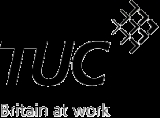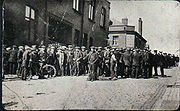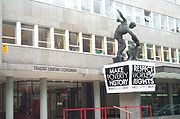
Trades Union Congress
Encyclopedia
The Trades Union Congress (TUC) is a national trade union centre
, a federation of trade union
s in the United Kingdom
, representing the majority of trade unions. There are fifty-eight affiliated unions with a total of about 6.5 million members, around half of whom are represented by Unite
or UNISON
.
The TUC's decision-making body is the Annual Congress, which takes place in September. Between congresses decisions are made by the General Council, which meets every two months. An Executive Committee is elected by the Council from its members. The senior paid official of the TUC is the General Secretary
, currently Brendan Barber
.
, who carries out the office for the remainder of the year and then presides over the following year's conference.

 The TUC was founded in the 1860s. The United Kingdom Alliance of Organised Trades, founded in Sheffield
The TUC was founded in the 1860s. The United Kingdom Alliance of Organised Trades, founded in Sheffield
, Yorkshire
, in 1866, was the immediate forerunner of the TUC, although efforts to expand local unions into regional or national organisations date back at least forty years earlier; in 1822, John Gast
formed a "Committee of the Useful Classes", sometimes described as an early national trades council.
However, the first TUC meeting was not held until 1868 when the Manchester and Salford Trades Council convened the founding meeting in the Manchester Mechanics' Institute (on what is now Princess Street
and was then David Street; the building is at no. 103). The fact that the TUC was formed by Northern Trades Councils was not coincidental. One of the issues which prompted this initiative was the perception that the London Trades Council (formed in 1860 and including, because of its location, many of the most prominent union leaders of the day) was taking a dominant role in speaking for the Trade Union Movement as a whole.
Arising out of the 1897 Congress, a decision was taken to form a more centralised trade union structure that would enable a more militant approach to be taken to fighting the employer and even achieving the socialist transformation of society. The result was the General Federation of Trade Unions
which was formed in 1899. For some years it was unclear which body (the GFTU or the TUC) would emerge as the national trade union centre for the UK and for a while both were recognised as such by different fraternal organisations in other countries. However, it was soon agreed amongst the major unions that the TUC should take the leading role and that this would be the central body of the organised Labour Movement in the UK. The GFTU continued in existence and remains to this day as a federation of (smaller, often craft-based) trade unions providing common services and facilities to its members (especially education and training services).
As the TUC expanded and formalised its role as the "General Staff of the Labour Movement" it incorporated the Trades Councils who had given birth to it, eventually becoming the body which authorised these local arms of the TUC to speak on behalf of the wider Trade Union Movement at local and County level. Also, as the TUC became increasingly bureaucratised, the Trades Councils (often led by militant and communist-influenced lay activists) found themselves being subject to political restrictions and purges (particularly during various anti-communist witch-hunts) and to having their role downplayed and marginalised. In some areas (especially in London and the South East) the Regional Councils of the TUC (dominated by paid officials of the unions) effectively took over the role of the County Associations of Trades Councils and these paid officials replaced elected lay-members as the spokespersons for the Trade Union Movement at County and Regional level. By the end of the 20th century local Trades Councils and County Associations of Trades Councils had become so ineffective and weak that many had simply faded into effective dissolution.
The 1899 Congress saw a motion "calling for a special conference to establish a voice for working people within parliament. Within the year the conference had been held and the Labour Representation Committee established (the forerunner of the Labour Party)." The major TUC affiliated unions still make up the great bulk of the British Labour Party
affiliated membership, but there is no formal/organisational link between the TUC and the party.
The Scottish Trades Union Congress
, which was formed in 1897, is a separate and autonomous organization.
The position of General Secretary of the Trades Union Congress was created in 1921, when the Parliamentary Committee of the TUC became the General Council. The General Secretary is the chief permanent officer of the TUC, and a major figure in the UK trade union movement.
or UNISON
. The number of unions affiliated to the TUC has declined dramatically over the twentieth century, as smaller unions repeatedly merged into larger ones.
National trade union center
A national trade union center is a federation or confederation of trade unions in a single country. Nearly every country in the world has a national trade union center, and many have more than one. When there is more than one national center, it is often because of ideological differences—in some...
, a federation of trade union
Trade union
A trade union, trades union or labor union is an organization of workers that have banded together to achieve common goals such as better working conditions. The trade union, through its leadership, bargains with the employer on behalf of union members and negotiates labour contracts with...
s in the United Kingdom
United Kingdom
The United Kingdom of Great Britain and Northern IrelandIn the United Kingdom and Dependencies, other languages have been officially recognised as legitimate autochthonous languages under the European Charter for Regional or Minority Languages...
, representing the majority of trade unions. There are fifty-eight affiliated unions with a total of about 6.5 million members, around half of whom are represented by Unite
Unite the Union
Unite – the Union, known as Unite, is a British and Irish trade union, formed on 1 May 2007, by the merger of Amicus and the Transport and General Workers' Union...
or UNISON
UNISON
UNISON is the largest trade union in the United Kingdom with over 1.3 million members.The union was formed in 1993 when three public sector trade unions, the National and Local Government Officers Association , the National Union of Public Employees and the Confederation of Health Service...
.
The TUC's decision-making body is the Annual Congress, which takes place in September. Between congresses decisions are made by the General Council, which meets every two months. An Executive Committee is elected by the Council from its members. The senior paid official of the TUC is the General Secretary
General Secretary of the TUC
The General Secretary of the TUC is the chief permanent officer of the Trades Union Congress, and a major figurehead in the trade union movement in the United Kingdom....
, currently Brendan Barber
Brendan Barber
Brendan Paul Barber has been the General Secretary of the United Kingdom's Trades Union Congress since June 2003.-Early life:...
.
Structure
TUC policy is made at its annual Congress, which meets for four days each year during September. Affiliated unions can send delegates to Congress, with the number of delegates they can send proportionate to their size. Each year Congress elects a President of the Trades Union CongressPresident of the Trades Union Congress
The President of the Trades Union Congress is a prominent but largely honorary position in British trade unionism.The President is elected at the annual conference of the Trades Union Congress . They officially fill the office for the remainder of the year and then preside over the following...
, who carries out the office for the remainder of the year and then presides over the following year's conference.
19th century


Sheffield
Sheffield is a city and metropolitan borough of South Yorkshire, England. Its name derives from the River Sheaf, which runs through the city. Historically a part of the West Riding of Yorkshire, and with some of its southern suburbs annexed from Derbyshire, the city has grown from its largely...
, Yorkshire
Yorkshire
Yorkshire is a historic county of northern England and the largest in the United Kingdom. Because of its great size in comparison to other English counties, functions have been increasingly undertaken over time by its subdivisions, which have also been subject to periodic reform...
, in 1866, was the immediate forerunner of the TUC, although efforts to expand local unions into regional or national organisations date back at least forty years earlier; in 1822, John Gast
John Gast
John Gast was a shipwright by trade who worked in the Deptford shipyards in south-east London , and an early trade unionist....
formed a "Committee of the Useful Classes", sometimes described as an early national trades council.
However, the first TUC meeting was not held until 1868 when the Manchester and Salford Trades Council convened the founding meeting in the Manchester Mechanics' Institute (on what is now Princess Street
Princess Street, Manchester
Princess Street is one of the main streets in Manchester City Centre, Greater Manchester, England. It begins at Cross Street and runs approximately eastwards across Mosley Street, Portland Street and Whitworth Street until the point where it continues as Brook Street and eventually joins the...
and was then David Street; the building is at no. 103). The fact that the TUC was formed by Northern Trades Councils was not coincidental. One of the issues which prompted this initiative was the perception that the London Trades Council (formed in 1860 and including, because of its location, many of the most prominent union leaders of the day) was taking a dominant role in speaking for the Trade Union Movement as a whole.
Arising out of the 1897 Congress, a decision was taken to form a more centralised trade union structure that would enable a more militant approach to be taken to fighting the employer and even achieving the socialist transformation of society. The result was the General Federation of Trade Unions
General Federation of Trade Unions (UK)
The General Federation of Trade Unions is a national trade union centre in the United Kingdom. It has 35 affiliates with a membership of just over 214,000 and describes itself as the "federation for specialist unions".-History:...
which was formed in 1899. For some years it was unclear which body (the GFTU or the TUC) would emerge as the national trade union centre for the UK and for a while both were recognised as such by different fraternal organisations in other countries. However, it was soon agreed amongst the major unions that the TUC should take the leading role and that this would be the central body of the organised Labour Movement in the UK. The GFTU continued in existence and remains to this day as a federation of (smaller, often craft-based) trade unions providing common services and facilities to its members (especially education and training services).
As the TUC expanded and formalised its role as the "General Staff of the Labour Movement" it incorporated the Trades Councils who had given birth to it, eventually becoming the body which authorised these local arms of the TUC to speak on behalf of the wider Trade Union Movement at local and County level. Also, as the TUC became increasingly bureaucratised, the Trades Councils (often led by militant and communist-influenced lay activists) found themselves being subject to political restrictions and purges (particularly during various anti-communist witch-hunts) and to having their role downplayed and marginalised. In some areas (especially in London and the South East) the Regional Councils of the TUC (dominated by paid officials of the unions) effectively took over the role of the County Associations of Trades Councils and these paid officials replaced elected lay-members as the spokespersons for the Trade Union Movement at County and Regional level. By the end of the 20th century local Trades Councils and County Associations of Trades Councils had become so ineffective and weak that many had simply faded into effective dissolution.
The 1899 Congress saw a motion "calling for a special conference to establish a voice for working people within parliament. Within the year the conference had been held and the Labour Representation Committee established (the forerunner of the Labour Party)." The major TUC affiliated unions still make up the great bulk of the British Labour Party
Labour Party (UK)
The Labour Party is a centre-left democratic socialist party in the United Kingdom. It surpassed the Liberal Party in general elections during the early 1920s, forming minority governments under Ramsay MacDonald in 1924 and 1929-1931. The party was in a wartime coalition from 1940 to 1945, after...
affiliated membership, but there is no formal/organisational link between the TUC and the party.
The Scottish Trades Union Congress
Scottish Trades Union Congress
The Scottish Trades Union Congress is the co-ordinating body of trade unions, and local Trades Councils, in Scotland. With 39 affiliated unions as of 2007, the STUC represents around 630,000 trade unionists....
, which was formed in 1897, is a separate and autonomous organization.
20th century
During the First World War, the Trades Union Congress generally supported the aims of the British Empire. However, in 1915, national conference voted against the introduction of military conscription.The position of General Secretary of the Trades Union Congress was created in 1921, when the Parliamentary Committee of the TUC became the General Council. The General Secretary is the chief permanent officer of the TUC, and a major figure in the UK trade union movement.
Members
The TUC has fifty-eight affiliated unions with a total of about 6.5 million members, around half of whom are represented by UniteUnite the Union
Unite – the Union, known as Unite, is a British and Irish trade union, formed on 1 May 2007, by the merger of Amicus and the Transport and General Workers' Union...
or UNISON
UNISON
UNISON is the largest trade union in the United Kingdom with over 1.3 million members.The union was formed in 1993 when three public sector trade unions, the National and Local Government Officers Association , the National Union of Public Employees and the Confederation of Health Service...
. The number of unions affiliated to the TUC has declined dramatically over the twentieth century, as smaller unions repeatedly merged into larger ones.
See also
- List of trade unions
- Labour Research DepartmentLabour Research DepartmentThe Labour Research Department is an independent trade union based research organisation, based in London, that provides information to support trade union activity and campaigns. LRD's publications Labour Research, Bargaining Report, Fact Service and LRD Booklets, along with an Enquiry Service...
- Unity Trust BankUnity Trust BankUnity Trust Bank Plc provides specialist banking services to trades unions and charities in the United Kingdom. Founded in 1984; head office is located at Nine Brindleyplace in Birmingham....

